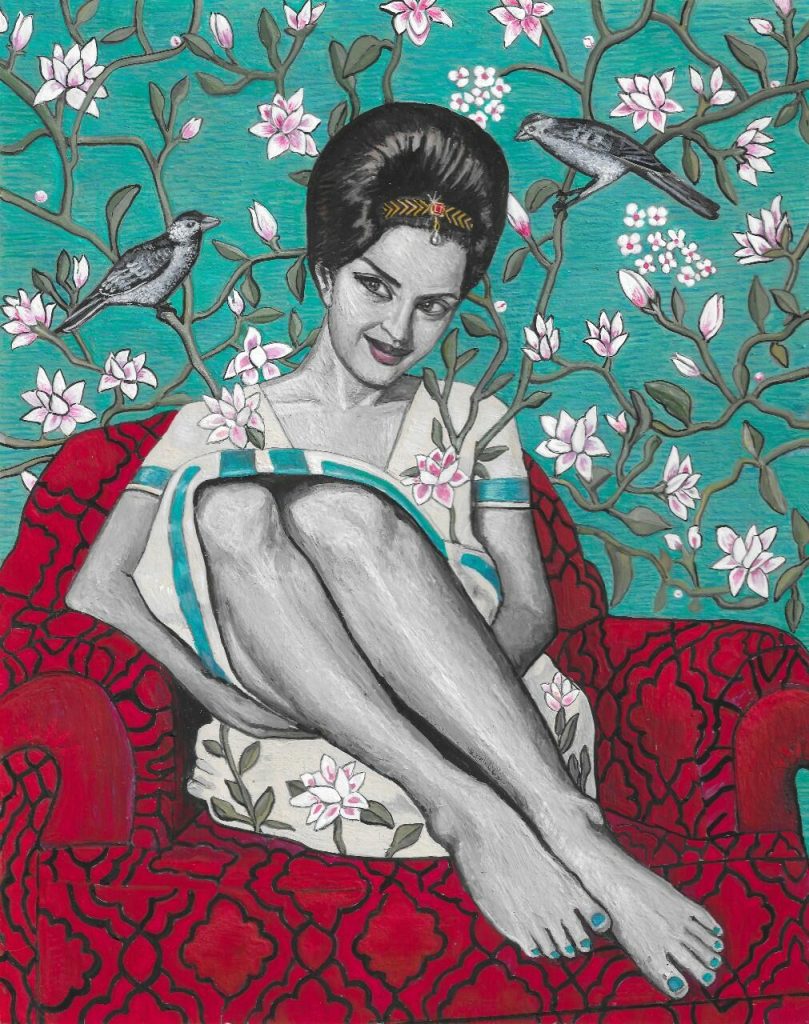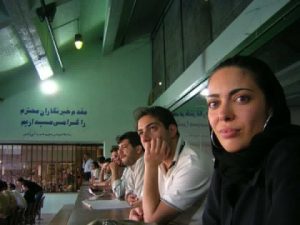8 Feb 2023 | Iran, Iraq, News and features, Syria, Turkey
The murder of a 22-year-old Kurdish woman in Iran by the Gasht-e-Ershad ‘guidance patrols’ in September sparked protests worldwide. Celebrities cut off their hair and chanted ‘Women, Life, Freedom’ in support of the movement born out of her funeral. But ‘Mahsa Amini’ – as she is identified by the mainstream press – is a misnomer.
“Her formal name according to the Iranian state is Mahsa, but she was known as Mahsa only by the authorities,” British-Kurdish writer and organiser Elif Sarican told Index. “She was known as Jina to her family, friends and everyone that knew her. It’s what is on her gravestone.”
Sarican described the deliberate misnaming of Kurds as a tactic to deny their existence. The insistence on calling Jina the wrong name is “painful” she said, particularly when it’s by the mainstream media.
“It’s very difficult in Iran – not impossible – but very difficult, to have a Kurdish name,” she explained. “The Iranian state is very specific about the kind of Iran it envisages. Unfortunately, similarly to other parts of Kurdistan, Kurdish people cannot name their children with Kurdish names.”
In 1990, Sarican and her family migrated to London from Maraş in north Kurdistan, the site of one of the largest Kurdish massacres in contemporary Turkey. It was aimed at people just like her family – Kurdish Alevis.
The unrest in Iran, Sarican says, is representative of a universal Kurdish experience. It’s an uprising of people that have been denied for 100 years.
“‘Women, Life Freedom’, or ‘Jin, Jîyan, Azadî’ in Kurdish, comes from the Kurdish Women’s Movement,” she continued. “It’s a part of the Kurdish Freedom Movement founded by the imprisoned Abdullah Öcalan.”
Since the news of Jina Amini’s murder broke, the slogan has been adopted internationally as a symbol of solidarity. But the phrase, Sarican tells me, has been dissociated from its radical, political origins. It exists as a result of decades of struggle for women’s liberation and marked a big shift in the Kurdish Freedom Movement when women’s liberation was adopted and cemented as a core pillar.
“Bringing together women, life and freedom is what the Kurdish Freedom Movement ideology is. It’s based on radical democracy, ecology and women’s liberation. All of these coming together is the only way to achieve freedom.”
It’s no surprise, she explains, that Iranian protesters took inspiration and borrowed this slogan from their brothers and sisters in other parts of Kurdistan. “This is an expression of universal Kurdish struggle.”
The persecution of Kurds persists across the region. “100 years ago – and this year is the 100-year anniversary of the Treaty of Lozan – the Kurdish regions were divided into four nation states: Turkey, Syria, Iraq and Iran. As a result of that, the experience of Kurdish people has been denied,” Sarican explained.
Kurdish language, culture and political expression are suppressed across the region. Fundamentally, they are denied the right to exist, she says. In Turkey, in the last 10 years, many Kurdish activists, elected MPs, mayors and councillors have been imprisoned. Although the Kurdish language is no longer formally banned in Turkey, it is repressed.
“To have education in your mother tongue is an international human right,” she explains. This is not a right granted to Kurds in Turkey.
While the treatment of Kurds in Iran, Syria and Iraq is brutal, Sarican says, it is limited to their own borders. Turkey not only oppresses Kurds in its own borders, but has invaded Syria, and continues to build military bases in northern Iraq.
“They are interfering in the lives of Kurdish people in at least three areas of Kurdistan. When the protests were happening in Iran and there was solidarity being shown in parts of Turkey, the police brutally cracked down on these demonstrations.”
Mournfully, she tells me that this month is the 10-year anniversary of the assassination of three Kurdish women by Turkish intelligence in Paris. In a disturbing mark of the anniversary, three more activists were assassinated in the same location just a few weeks ago.
“The Kurdish people are feeling unsafe not only in most parts of Kurdistan, but also in other parts of Europe,” Sarican continued.
Kurdish people constitute 10% of Iran’s population but make up about 50% of their political prisoner numbers. Many prisoners are denied proper health access, the most basic human rights, proper visits with family and connection with the outside world. Sadly, she says, many European states also extend these policies against Kurdish people in Europe.
“Kurdish communities are some of the most politically organised. The Kurdish freedom movement is not only one of the biggest political movements in the Middle East right now it is actually one of the largest social movements in Europe as well. [Criminalisation of our communities] really curtails and impacts the organising and protests.”
“Staying in tune with what’s happening in Kurdistan is of the utmost importance. It’s important that any future, whether it’s in Turkey or Iran – because it’s all connected, very very closely – is a future that works for the people. That’s a future of radical democracy, of ecology and of women’s liberation. Because otherwise these theocratic dictatorships will cement themselves.”
She stressed the significance of understanding the political projects that are already in existence across Kurdistan, instead of trying to impose a Western solution. “My call would be for people to understand the Kurdish Freedom Movement programme and what it’s offering. Read the memoir of Kurdish revolutionary Sakine Cansiz. Read the works of Abdullah Öcalan. Understand what the political project is and how we can work together to realise it. [The crisis in the Middle East] will only result in an actual, meaningful freedom if there is a political vision, led by the Kurdish freedom movement. It’s time we support that movement and come together to make sure that that is what the future of Kurdistan looks like.”
1 Feb 2023 | Iran, News and features

Wild at Heart (Portrait of Pouran Shapoori), 2019 Credit: Soheila Sokhanvari, courtesy Kristin Hjellegjerde Gallery
The long, winding path of The Curve art gallery at London’s Barbican Centre has been transformed into a devotional space. The cavernous room is dimly lit and echoes with the calming voices of female Iranian singers. Sprawling, Islamic, geometric patterns roll down the tall walls which are splintered with the light projected onto them by dazzling mirrored sculptures. Apart from the female voices, it feels like a mosque.
Take a closer look, and the walls are scattered with traditional Persian miniatures, depicting women whose histories have been erased in Iran. In painstaking detail, Soheila Sokhanvari’s portraits provide a snapshot into women’s lives pre-revolution. Born in Shiraz in the Fars Province of Iran, she came to England in 1978, just a year before the Islamic Revolution. But Sokhanvari remains enchanted with the country she left behind. Her miniatures depict unveiled and glamorous women, creative dissidents who pursued careers in a country awash with Western style but not its freedoms.
“I can relate directly to the women in my paintings,” she told Index. “Like them I am an artist but, unlike them, I am able to pursue my career, wear what I want and act as I want, and the idea that one day someone could take my freedom away from me is unthinkable”.
The portraits are displayed without names or biographical info but, by scanning a QR code, we are guided through the exhibition by their stories. There are 28 in total: actors, singers, poets, writers, dancers and film directors, all of which were either forced into silence or exile in 1979, when the Islamic Revolution led to a rollback in women’s legal rights. Much of their work is censored in Iran today. “I knew of many of the women from my own experience and time in Iran as a young girl,” Sokhanvari explained. “They were my idols, but finding out more information about the lives of several of the women took lots of research – they were essentially erased from the record by the regime”. She said that a small number of the women – like singer and actress Googoosh – are very famous, but that several had tragically died too young and were hard to trace.
The exhibition draws the spotlight back onto these talented women for which, she says, she feels a deep loss. The portraits beautifully capture this feeling: a simultaneous celebration of their bravery and a mourning of their freedoms. Vivid patterns and clothing contrast monochromatic faces, which make the pictures feel both vibrant and ghostly. The use of new and old multimedia was significant in telling these stories too. “I painted my portraits in the ancient technique of egg tempera, onto calf vellum, and I included films in which the women starred, ” Sokhanvari said. Two holograms of dancing Iranian actors Kobra Saeedi and Jamileh are also hidden in boxes. “I wanted the viewers to see these women, to watch them dance and to hear them sing, since they have been banned from these platforms.” The broadcasting of women’s voices in public is illegal in Iran. “I wanted to show these women at the height of their creativity, to show them as the sensational artists that they are, and using multimedia helped to achieve this immersive experience.”
This contrast of old and new is fitting. While the exhibition was curated without sight of the current unrest in Iran, the portraits certainly gain a tragic poignancy because of it. The brave women of Sokhanvari’s portraits embody much of what people are fighting for today. “Young women are at the front of this revolution and that is what gives it its power,” she told Index. “I feel a new sense of positivity and hope that perhaps we will see the end of this regime, but simultaneously I feel pain and bitterness that it is at the cost of so many bright lives.”
Although she doesn’t describe her artwork as a protest, she says that the message is political.
“What is happening in Iran can no longer be seen as just another protest, it is a revolution and I stand in solidarity with my sisters.” I asked if her portraits reflect a lost past or a hopeful future. She says both.
‘Rebel Rebel’ at The Curve, Barbican is open until 26 February 2023
11 Jan 2023 | Iran, News and features
As of last week four young men have been executed at the hands of the Iranian regime. They were arrested while participating in the recent protests sparked by the death in custody of Jina (Mahsa) Amini. After being tortured and forced to make confessions, they faced grossly unfair show trials. Without strong condemnation, this death toll will grow – there are many more who have currently been sentenced to execution. Here we remember those four who died fighting for freedom.
Mohammad Mehdi Karami
Mohammad Mehdi Karami was a 22-year-old Kurdish Iranian man From Karaj in the Alborz province of Iran. He was arrested on 5 November 2022 for allegedly killing a member of the security forces and was executed just two months later on 7 January. At the time of his death, he had been on hunger strike for four days, demanding access to his lawyer.
Mohammad was a national karate champion who had several national titles. In an interview with Etemad newspaper, his father describes Mohammad as “an athlete who constantly strived to achieve honours”. In the video, uploaded on 12 December, he pleads with authorities to release his son and recounts various attempts to contact the lawyer who was appointed to his son by the judiciary, all of which were ignored. He describes a phone conversation with Mohammad in which the young man sobbed and begged his father not to tell his mother about his sentence. “Mehdi’s mother is very attached to him,” he said. “If something happens to Mehdi, our lives will also end”.
Mohammad attempted to appeal his sentence but was denied. His father maintains that on their final phone call, his son swore to have not committed murder. The family was not allowed to see him to say goodbye before he was hanged. They camped outside the Rajai Shahr prison in Karaj. The prison guards reassured them that he was alive and well. They told the family that rumours of execution were false and to return home. Mohammad’s grave is in Eshtehard, Alborz. Mehdi Beyk, the journalist who interviewed Karami’s parents, was later arrested.
Seyed Mohammad Hosseini
Seyed Mohammad Hosseini, 39, was a worker remembered for volunteering with children by a German parliamentarian who advocated his case.
Hosseini was convicted for allegedly murdering a member of the security forces and was executed on 7 January. His lawyer, Ali Sharifzadeh Ardakani, described meeting him in prison: “He was in tears, talking about how he was tortured and beaten while blindfolded.” Ardakani previously revealed that the court had denied him access to case materials to defend his client during the entire interrogation and trial process.
Seyed Mohammad was an orphan with no immediate family to receive his body after his execution. His brother was also arrested but disappeared after release. Mohammad’s friends weren’t allowed to visit him in prison. He was buried near Mohammad Mehdi Karami’s grave in Eshtehard, Alborz. Mohammad Mehdi’s family attended Mohammad’s grave, lit candles and placed flowers there in his memory.
Majidreza Rahnavard
Majidreza Rahnavard was publicly executed on 12 December, just 23 days after his arrest.

Majidreza Rahnavard. Photo: 1500tasvir_en (CC BY-SA 4.0)
He was charged with allegedly fatally stabbing two Basij militia volunteers. The 23-year-old was denied a lawyer of his choice for his trial.
The lawyer he was given did not put up a defence. Mahmood Amiry-Moghaddam, director of Norway-based Iran Human Rights, tweeted that Rahnavard was sentenced based on “coerced confessions, after a grossly unfair process and a show trial”.
Majidreza’s mother was not told about his execution until after his death. Activist collective 1500tasvir said on Twitter that the family received a telephone call from an official at 07:00 local time. They said: “We have killed your son and buried his body in Behesht-e Reza cemetery.”
In a video aired by authorities, Rahnavard appears blindfolded, surrounded by masked men. He is asked what he wrote in his will. He says: “I don’t want anyone to pray, or to cry. I want everyone to be happy and play happy music.”
Mohsen Shekari
Mohsen Shekari, 23, worked in a cafe. He was arrested on 25 September for trying to stop security forces from attacking protesters in Tehran. He was the first person to be executed by the state on 8 December after being convicted of injuring a member of Iran’s Basij militia or “waging war against God”. While authorities asserted that he wielded a machete, Shekari’s family disputed this version of events, claiming he used non-violent means to separate protesters and security forces.

Mohsen Shekari. Photo: Unknown (CC BY 4.0).
Shekari’s uncle told The Guardian that authorities did not release his body. Other families of dead protesters have made similar statements. He said that the family had been sent to two cemeteries, but that when they arrived at the locations, they were told the body was not there. Although Mohsen’s mother saw her son the night before his hanging, she was ordered to remain silent about his fate.
Shekari’s judge had the choice to impose a lighter sentence and chose not to do so. Shekari appealed the verdict but was denied by Iran’s Supreme Court, despite the fact that he was not represented by his lawyer at the time of the appeal.
6 Jan 2023 | FEATURED: Mark Frary, Iran, News and features

Ramita Navai in Iran in 2005, at a time when women journalists were temporarily allowed in to report on football matches
Up to 20,000 people have now been detained as a result of the protests that have wracked Iran in the past three months. Those who have been detained have been subject to physical and psychological torture, rape and been made to make forced confessions. Some, including 22-year-old Mahsa (Jina) Amini whose death sparked the current protests, have died in custody.
The British-Iranian investigative journalist and documentary maker Ramita Navai knows only too well what those who have been detained are facing. She has been detained by the Iranian authorities several times over the years.
Her first arrest came just after she had started working as Tehran correspondent for The Times and was covering the anniversary of the Islamic Revolution.
“I was at a rally with a lot of other journalists and I was interviewing some Iranians. Before I knew it, two undercover intelligence agents had taken me away; none of my colleagues saw me being taken. It was a terrifying experience. They took me to an abandoned warehouse with broken windows and flexes hanging from the ceiling and there was an armed man standing outside the room. They took all my possessions and carried a table and chairs into the room before starting with a good cop/bad cop routine. It was very manipulative psychologically and was designed to break me. They started telling me that I had been asking anti-revolutionary questions and said I had been telling people how to answer. It was all lies but I was utterly unprepared for this.”
Her interrogators asked her whether she had heard of Zahra Kazemi, a Canadian-Iranian photojournalist who had been killed in police custody shortly before Navai had arrived in Iran.
“Every journalist knew what had happened to her and they were hinting that I would suffer the same fate. I was so petrified I started sobbing.”
Navai was one of the lucky ones. A few hours after being taken, one of her journalist colleagues, Jim Muir of the BBC, noticed she was missing and started talking to the Iraniansat the rally. One whispered to him that they had seen her being taken away.
“He phoned up the Ministry of Islamic Culture and Guidance and said we know you have got her, you had better release her otherwise I am going to cause a fuss about this.”
Navai was released shortly afterwards.
Since then Navai has won numerous awards for her documentary work, including an Emmy for her PBS Frontline documentary Syria Undercover in 2012 and a Royal Television Society Journalism Award for her documentary on tracking down refugee kidnap gangs for Channel 4.
But it is Iran, the country of her birth, where her heart lies.
Her 2014 book City of Lies, which won her the Royal Society of Literature’s Jerwood Award for non-fiction, tells the stories of ordinary Iranians forced to live extraordinary lives: the porn star, the ageing socialite, the assassin and enemy of the state who ends up working for the Republic, the dutiful housewife who files for divorce, and the old-time thug running a gambling den.
Tehran, the City of Lies of the title, is described with romantic nostalgia but rails against the hypocrisy of the regime.
Navai feels there is “no turning back” from the current protests.
“This time feels very different. I think the protests are unlike anything we have ever seen. Significantly, they span all social classes, ethnicities and the protests have happened in every one of Iran’s provinces. The protests have been a unifying force, uniting Iranians of all colours against the regime. I don’t think the regime will fall imminently although I do think something has shifted and there is no going back from that. I think a very different future for Iran has now become a reality in a way that it wasn’t a year ago.”
She adds, “The most organised groups seem to be the Iranian feminist and women’s rights networks because they have been used to mobilising for such a long time. They are used to being arrested and imprisoned. They issue secret missives and are coordinating with some of the activists in prison.”

Navai and her mother Laya at a demonstration in London in support of the Iranian protests
Navai believes it is the moment for Iranian women and those of Generation Z in particular.
“The women’s groups were crushed in 2009 – they were a thorn in the side of the regime. What we are seeing now is a strengthening and a rising up,” she says. “In 2009, it was people my age who were and are very fearful of the regime. The younger generation – Generation Z – are absolutely fearless. My generation always felt like they had something to lose. The regime is brilliant at playing this game of giving people just enough freedom to shut them up. This younger generation have grown up in a very different world, a completely connected Iran in which they have been influenced by global popular culture. They know what is out there in the world. They know all the opportunities that should be open and available to them and they are angry and they are fearless.”
She believes a sexual awakening is also happening in Iran.
“We are talking about this being a women-led uprising, partly this is because this sexual awakening has changed the socio-cultural dynamics for Generation Z. In real terms, virginity is not the thing it used to be. So many couples are living together outside marriage that the Supreme Leader’s office issued an edict saying how immoral it is. These are ordinary Iranians, not just the middle and upper class. There has been this massive socio-cultural shift. Generation Z are used to different social norms and strictures and they are not going to be told what to do. They want full autonomy not only over their bodies but over their lives.”
In the intervening years, Iranian people have become even more resourceful than in previous protests.
“This is what 43 years of a repressive and censorious regime have done,” says Navai. “Most Iranians have VPNs [virtual private networks]. There are occasional blackouts – not all VPNs keep working so they have to change them. Iranian exiles are paying for that service, sending login details to Iranians within the country to help them mobilise. They have also been mobilising in quite interesting ways using social media but actually also old-fashioned meet-ups.”
The recent public expressions of protest by leading Iranians, such as the actress Taraneh Alidoosti and a women’s basketball team, are “hugely significant”, she believes.
“They are emboldening the protesters to rise up against the regime,” she says. “I also think these high-profile protests and the world’s media and social media are a really important tool for this uprising. It is the oxygen that is keeping these protests going. Without the world watching I think the regime would be far more brutal. It has already been very brutal. It hasn’t unleashed its might yet and I am scared that it will.”
In many revolutions, it is when the military switches sides, abandoning their loyalty to the leaders under pressure from the people that real change happens. Indeed, some experts have speculated that change will only come to Iran when that happens. However, there are good reasons to think that may not happen.
Iran’s regular armed forces number around 420,000 plus another 300,000 or so who are reservists who can be called up.
What is perhaps stopping them from switching their loyalty is the Islamic Revolutionary Guard Corps, set up by Ayatollah Khomeini in 1979.
“You have 100,000 to 150,000 soldiers who are the Revolutionary Guard,” says Navai. “It was set up to ensure loyalty to the Supreme Leader and the state and act as a counter-balance to monitor the ordinary forces. These Revolutionary Guardsmen are better trained, far better equipped and are far more loyal – they are ideologically motivated and answer directly to the Supreme Leader. It will be a big turning point if the army turns, however I think that could also result in a bloodbath.”
There are also the Iranian regime’s allies beyond the country’s borders – the Shia militia in Iraq and Hezbollah.
What is clear from Navai’s City of Lies is the widespread hypocrisy of the Iranian regime. It tells stories of clerics using prostitutes and the ubiquity of porn.
“This is one of many reasons that Iranians have had enough,” says Navai. “The regime is not only corrupt politically, it is corrupt morally. While the state enforces laws that govern its citizens’ most intimate affairs meanwhile people in power do as they please. You have people in power whose children are partying in Iran and across the world, doing drugs, wearing whatever they want and having normal sexual relations that are not allowed under the regime. It is this hypocrisy that people are finally fed up with.”





